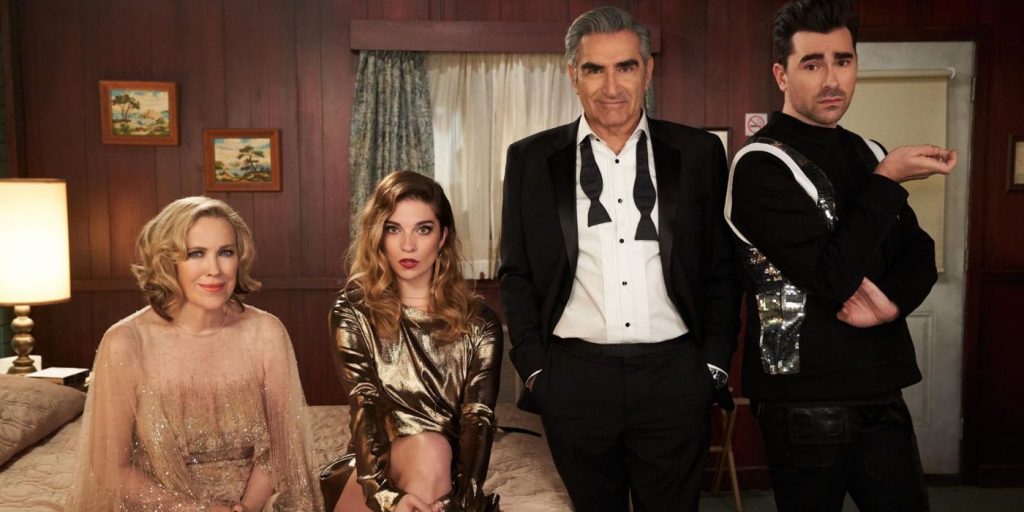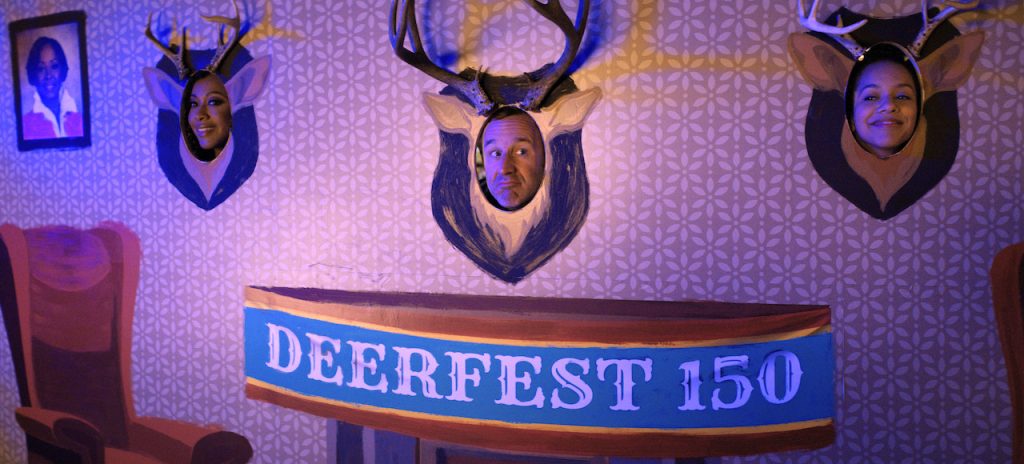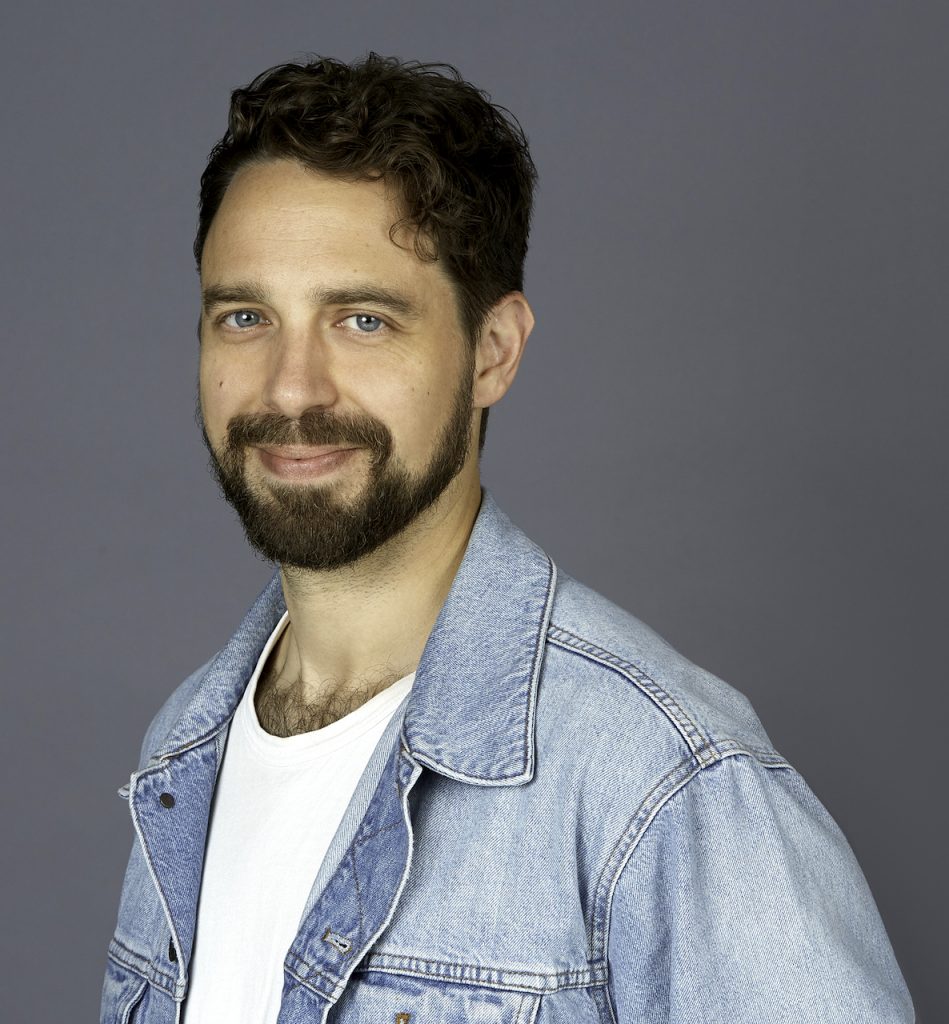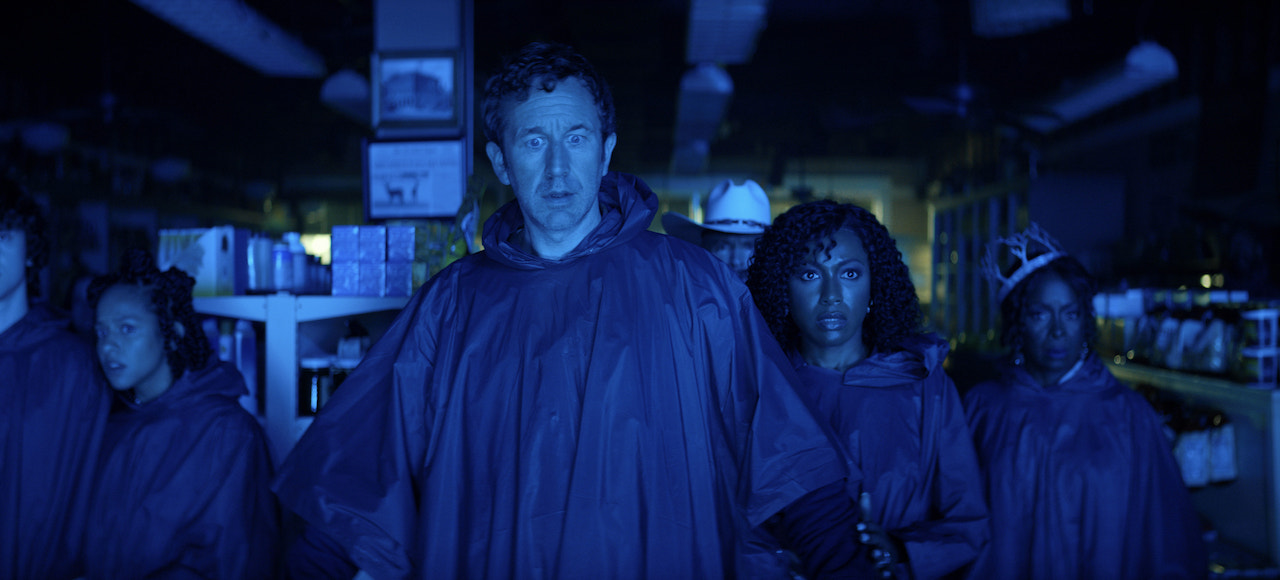“I don’t know what made me want to be a writer, but I loved doing it from a very early age,” says screenwriter David West Read.“ I started making movies with my friends when I was in elementary school. I would have them over for sleepovers, then hand out scripts.” Back then, the parodies were Jurassic Pork and David Read’s A Christmas Carol.
“It’s something I gravitated towards. I thought for a long time about doing something more stable and secure, something with a clearer path through university, but writing was the thing I kept coming back to and the thing in my free time that brought me the most joy. I don’t know why we’re drawn to the things we’re drawn to, but I’ve been drawn to writing for performance for as long as I can remember.”
If one were to only examine Read’s IMDb page, it looks like he came out of nowhere to land a job writing twenty-eight episodes of Schitt’s Creek and then a showrunner title for The Big Door Prize, but that’s certainly not the case. “I studied at NYU Tisch School of the Arts and then Julliard for playwriting.” One of the plays he wrote back then as a student, his teacher, who he somewhat apprenticed for, shared it with an agent and it was produced Off-Broadway.
“Theater was so immediate. When you’re just starting out writing, the idea of writing a TV show or making a movie, it seems so out of reach. With stage writing, you can bring a few actors together, have them read it for a group of friends, and it already feels like a performance. It already feels closer to the finish line.” Read’s second play, The Performers, goes backstage at the adult film awards. It went straight to Broadway while Read was still a student at the time.
While this sounds like a meteoric success story, The Performers opened during Hurricane Sandy and it opened and closed in four days, becoming one of the biggest flops in Broadway history. “I feel really proud of the show and audiences were enjoying it, but it was a disaster from a producer’s standpoint. I had more experienced writers than me reaching out and saying it’s great to get this behind you.”
David Auburn, the playwright known for Proof and Lost Lake, wrote Read a letter saying, “Everyone has one or more of these stories and you build resiliency by not having everything go well.” Read adds, “I didn’t feel any golden handcuffs because I blew up so quickly and exploded.” Explosions aside, when Schitt’s Creek, a sleeper Canadian comedy looking for Canadian writers approached Read, it was an obvious “Yes” from the young writer.
Writing for Schitt’s Creek
The writers’ room wasn’t a major stretch for Read because that’s how the schools he attended were set up. “I don’t think you have to go to school to be a writer. In fact, you definitely don’t, but at NYU and Julliard, it was more like a writers’ room than a traditional class because you were bringing in work every week, sharing with friends, reading stuff, they were reading your stuff, and you were learning how to give constructive criticism. Every time you read something by somebody else, you’re also thinking about your own process.”
He adds, “Being in that kind of group, I’d recommend it to any young writer, whether it’s in school or among writing friends. To have constant feedback and to get used to having people say ‘no’ or ‘yes’ or ‘we like that’ or ‘we don’t like that’ and getting used to helping other people fulfill their vision. That’s all it means to be in the writers’ room. You have your own voice, but it’s about adapting your voice to fulfill something someone else is trying to achieve.”
From this perspective, you see what story the showrunner is trying to tell and your job is simply to help them try and tell it better. For Schitt’s Creek, Read came in on the second season, so he was matching content that was already there for the father-son creators Dan and Eugene Levy. Back then it was still a show mostly unnoticed, but of course, that changed by the fourth season and the show continues to grow in popularity today.

Main cast of Schitt’s Creek. Photo courtesy of CBC
“We felt like we were making it in a bubble in Canada, but then when it went on Netflix, and there were four seasons to binge, it really exploded from there. But we had very few notes from the beginning as it was a CBC show in Canada show — Pop TV in the US — and it had a lot of star power with Eugene Levy and Catherine O’Hara, and they really let Dan and Eugene do their thing with very little notes. It was amazing, unprecedented, and nothing I’ll ever have again,” jokes Read.
When you look at shows like Schitt’s Creek or The Big Door Prize, there seems to be new rules for sitcoms. “Sitcom just means situational. It is all situational, but I don’t think of sitcom as a dirty word. I think there’s a show like Schitt’s Creek that is more traditional in the reset. Characters move forward by inches, but not significantly from episode to episode. There’s a comfort from those places and those people, knowing you can drop it into any episode and it’s going to be relatively the same.”
Then, with shows like The Big Door Prize, which is also on Apple TV+ alongside Shrinking and Ted Lasso, drama is expected. “There’s a shorter lifespan, so there’s more expectation for story and plot to move forward with each episode. They feel much more serialized, but there’s room for both. Something I learned on Schitt’s Creek was the importance of not having characters fundamentally change over night.”
Anytime they tried to soften Moira, for example, actress Catherine O’Hara who plays her fought back. There’s one scene where the Rose family is hugging, for example, Moira walks in, sees the other three hugging, and says “Why?” and then exits. “I think that was important for the longevity of the show.”
Creating The Big Door Prize
“People are making huge changes on The Big Door Prize. That’s the theme of the show – to reevaluate your life choices to fulfill your potential. I’m trying to protect these characters. People grow really slowly in life, if it all. You take two steps forward and one step back. I think that’s how you preserve the longevity of the show, but also make the characters feel real.”
While there’s no formula to the rise and fall of characters, Read says he has an “allergy” to shows where characters are “all nice” or “all redeemed” and “more perfect than people you spend everyday with.” He says, “It’s important that everyone has flaws. In standard sitcoms, there’s the bumbling husband and the smart wife who points out how bumbling he is and she never makes any mistakes. I love that everyone on our show is making mistakes because they’re trying things.”

Cass (Gabrielle Dennis), Dusty (Chris O’Dowd) and Trina (Djouliet Amara) Photo courtesy Apple TV+
“There’s a quality in over-reaching. You can find comedy in the gap of where someone wants to be or thinks they should be and where they actually are. The comedy of taking bigger swings than you should take is really appealing to me.” This particular example comes from a book by M.O. Walsh by the same name. “I read it just before the pandemic. I was already into comedy with a slight sci-fi edge, but as time went on, the themes of starting over, thinking about choices you made, the things you wanted to do but haven’t done, it felt more and more timely.”
Read says that when you seek out a book to adapt, you want something with an amazing premise, but also room for growth. “The book will always be the book, but it’s a starting off point. I felt like you could add characters, change characters, and take them further, so you build an ensemble cast to explore one idea: what if there were a machine that could tell you your life’s potential?”
From this jumping off point, the writers have room to explore a variety of themes. “I feel like the big ideas kind of flow organically from the writers’ room because you just bring what you’re feeling or thinking or reading into the room everyday. It’s exciting to find a group of really smart people who have these questions themselves. What I try to aim for is a show that asks a lot of questions without answering any of them, at least with the profound questions. What does it mean to be happy? What does it mean to fulfill your potential? Do you need to fulfill your potential in order to be happy?”
From Writer to Showrunner
Some of these larger than life, existential questions came up during the pitch of The Big Door Prize. “This is a story about a town going through a collective mid-life crisis, examining what it means to be happy. The jumping-off point is Dusty (Chris O’Dowd), someone who has been told he already reached his peak, thinks he is happy, but is then told this is all there is for him. That opens up a chasm of doubt and anxiety for him.”
When it was time to staff his own writers’ room, Read says he looks for specs with a similar tone to his own, and decides if he will want to work with this person in an in-person meeting, but some luck is involved. “The alchemy of the room is something you can’t really predict. You want different voices and you hope they meld together. Something I learned is that you’re always pushing yourself to expand and build the show, but you also want to lean into the things that are working, the things the audience gravitates towards and not change the show fundamentally.”

David West Read
“You want to go deeper from season 1 to season 2, rather than a kind of Etch A Sketch, where you shake it all up and start again. In some shows, there’s a pressure where it’s a year between seasons to do something different. But you have to realize that most people have only watched this for five hours of their life. You may have been working for a whole year, but [viewers] are just getting to know these characters. I learned the value of baby steps on Schitt’s Creek. You slowly build over eighty episodes.”
If one were to look for a common element across Read’s career, it’s character-driven comedy. “I’m not really a joke writer. I can’t crank out one-liners, but I love Christopher Guest movies, which is why I was so excited to work with Catherine and Eugene. They’re never pushing for laughs. They’re just being honest, truthful and committed. To me, comedy is all about commitment.”
Looking back at his earlier work, he says he felt he just mimicked Christopher Guest or Ricky Gervais, but soon found his own voice. “I started to figure out who I am in the spectrum of comedy. Then you can trust your instincts a little more, but I think you just have to absorb so much and go through that period of imitation before you break through with your own individual take.”
Working with Actors
If you watch any comedy pilot, there’s often some major character changes in the first season, partially from the actor and partially from a number of outside forces. For The Big Door Prize, however, it was straight to series, so they wrote the entire season before casting the show. Then, with Chris O’Dowd in the lead role, Dusty had to be Irish.
“That wasn’t something we originally planned, but then that led to such great story opportunities. How does the immigrant experience of someone who comes to America and has the American Dream play out, and then is told maybe there’s something else, maybe you could be happier? So you get to be more and more specific when you know the actor.”
As the showrunner, because it’s an ensemble, Read wanted to take time with each actor to discuss the big picture arc before they even hand over the scripts. “This way, it’s not such a surprise so they can see the pieces we’re putting together and where we want to end up, so they can read with that in mind. But I tend to do it in pieces because the actor shouldn’t always know where they’re going. You don’t want them playing ahead during the season. It’s a dialogue and I try to collaborate as much as possible.”
For this show in particular, the shows are actually titled after the characters. Episode 1 is called Dusty. Episode 2 is called Cass and so on. “It’s something we wanted to try for the first season. It’s not an anthology show, but as the overarching story moves forward, we also dive into different character experiences with each episode. It’s a slightly different visual style, depending where that character is.”
As for final pieces of advice for writers, Read says, “You have to pay your dues.” He clarifies, “I sometimes skip over this part of the story, but I assisted my teacher for a long-time before he shared my play with his agent. I never asked him to do that. I was just looking for opportunities to learn. Some people think they have an innate talent and should just go to the finish line, but I think, finding opportunities to help out, to observe how a writer works, is so essential. All of the students were given the same opportunities, not everyone took people up on the offer. The secret, to me, is that it’s not my talent or anything. I just looked for those opportunities to learn and made the most of them.”
Currently, in addition to The Big Door Prize, Read is working on another comedy series for Apple TV+ which will star Matthew McConaughey and Woody Harrelson. “They play themselves, we explore their real-life friendship. The premise is that Woody and his family move onto Matthew’s ranch with his family. It is this blended family comedy. It is a sitcom. It just happens to have two of the biggest movie stars in the world.”
This interview has been condensed. Listen to the full audio version here.

